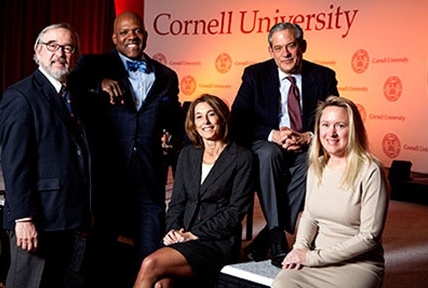
Panelists for the Jan. 18 "Health Care Today, Implications for Tomorrow" discussion, from left, Dr. Philip R. Reilly '69 (moderator); Ruben J. King-Shaw Jr. '83; Dr. Laurie H. Glimcher, dean of Weill Cornell Medical College and Cornell's provost for medical affairs; Gene D. Resnick '70, M.D. '74; and Dr. Katrina S. Firlik '91. Photo credit: Lindsay France/University Photography
Cutbacks in biomedical research funding are among the greatest roadblocks to game-changing discoveries that will transform health care.
That's the assessment from Dr. Laurie H. Glimcher, the Stephen and Suzanne Weiss Dean of Weill Cornell Medical College and provost for medical affairs at Cornell University, who participated in a panel discussion, "Health Care Today, Implications for Tomorrow," during the fourth annual Cornell Alumni Leadership Conference Jan. 18-20 in Boston, Mass.
The annual event, hosted by the Cornell University Office of Alumni Affairs, brings together alumni volunteers from classes, affinity and diversity groups, regional and international clubs, and other organizations to participate in training, share best practices, develop strategic programming and network. This was the fourth annual CALC and the first in Boston, and attended by more than 800 Cornellians.
Along with more than three dozen sessions devoted to topics such as diversity networking and engagement, online community building, leadership skills, succession planning and philanthropy in higher education, the conference's headline event was a Jan. 18 panel discussion, "Health Care Today, Implications for Tomorrow," moderated by Dr. Philip R. Reilly '69, a partner at Third Rock Ventures and a Cornell trustee with a long-standing interest in genetic testing and developing new therapies for genetic diseases.
Alumni-elected trustee Sheryl Tucker '78, special projects manager for philanthropy at Time Inc., introduced the discussion. In addition to Dr. Glimcher, the panelists were alumni trustee Dr. Gene D. Resnick, '70, M.D., '74, chief medical officer and executive vice president of Aptiv Solutions; Dr. Katrina S. Firlik, '91, chief medical officer and co-founder of HealthPrize Technologies; and Cornell trustee Ruben J. King-Shaw Jr., '83, managing partner and chief investment officer at Mansa Capital.
Dr. Glimcher said fiscal constraints are among the biggest challenges to the research community's work to improve health care. She noted that funding from the biggest supporter of medical research, the U.S. National Institutes of Health, has fallen by about 20 percent over the last decade.
"That means that we're not funding our best and brightest scientists," she said — just as new technologies and "precision medicine" have brought researchers to the edge of a new era where discoveries made in the lab will be translated quickly into therapeutic approaches.
Asked about how to streamline regulatory procedures, Dr. Resnick said the prospects for new drugs and devices in the U.S. and worldwide are bright, explaining that a new focus on outcomes derived from evidence-based research will lead to less waste and less money spent on treatments with few proven advantages.
Dr. Firlik's company focuses on patient behavior and on integrating patients into the health care system. "It's not enough to have an effective drug — you have to have effective patients," she said. Clinical trials usually have 100 percent compliance, she said, and compliance rates for prescribed medications are only 50-70 percent.
Asked where investment dollars in health care should be directed, King-Shaw argued that because federal health care reform, also known as Obamacare, will pay hospitals and other providers based on outcomes, investment should be made in strategies to collect, aggregate and disseminate data.
Panelists discussed the need for more and better data (electronic recordkeeping would reduce the $17 billion cost of medical errors each year, Dr. Glimcher said), and the need to focus on preventive medicine.
The majority of Americans live in areas underserved by primary care physicians, Dr. Resnick said.
"We are facing a shortage — not just of research scientists, but also of family practitioners," he added.
Panelists noted that another significant challenge is the debt that medical students face upon graduation — often driving those who might otherwise want to focus on primary or family care into higher-paying specialties.
Asked about what innovative partnerships are needed in the health care industry, Dr. Glimcher suggested infiltrating communities with "health care workers — not just physicians, but 'physician extenders.'" Dr. Firlik said mobile technology holds promise.
King-Shaw said he is working on a project that would establish urban grocery stores and add health coaches, educators, physicians and on-site clinics, creating an intersection of diet, medicine and health education.
They also agreed that the high cost of malpractice insurance and litigation posed another obstacle.
"We're challenged by society to choose between bad outcomes and bad practices," Dr. Resnick said. "The very best practitioners in the very best institution can do their very best and still have a bad outcome ... and those bad outcomes end up in our legal system."
Answering a question on the one thing she would do to improve health care in the United States, Dr. Firlik said she would want to "make sure that the best and brightest of our students go into science and medicine," she said. "We're in a society where the Academy Awards trump Nobel prizes in terms of people's interest."
Glimcher said she "would break down the silos between our scientists and our clinicians, because we need to go not only bench to bedside, but bedside back to bench."
About 470 CALC participants and other Cornellians in the Boston area attended the discussion.
